Michael Johnston's Blog, page 10
January 2, 2015
‘The Little Stranger’ by Sarah Waters
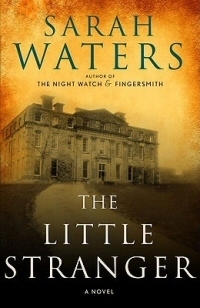 This was my first Sarah Waters novel which, like all too many books, has been waiting patiently on my shelf to be read. All her work seems to have attracted prizes and awards and this book was shortlisted for the Man Booker in 2009. It turns out to be very much more than a 20th Century ghost story.
This was my first Sarah Waters novel which, like all too many books, has been waiting patiently on my shelf to be read. All her work seems to have attracted prizes and awards and this book was shortlisted for the Man Booker in 2009. It turns out to be very much more than a 20th Century ghost story.
Set in the period just after the end of World War II, the narrator is a bachelor GP in rural Warwickshire at that time when the National Health Service was still to be created and a trip to the doctor cost real money. Dr Faraday knew Hundreds Hall from the time his mother took him behind the scenes at an Empire Day picnic hosted there by the Ayres family in 1919. She was a former maid servant there and her backstairs friends gave him jelly to eat. Now, a generation later, he stands in for his partner when there is an urgent summons from Hundreds to treat an ailing young maid. He is shocked by the transformation of the once stately home that now stands dilapidated in untended grounds. Widowed Mrs Ayres lives there now with her son and daughter. He is war-wounded and shell-shocked while the daughter merits the damning description of ‘handsome’. Apart from that, there is nothing really wrong with the maid who is simply miserable with the gloomy house and oppressed with the feeling that there is something strange inhabiting Hundreds.
We learn that an older sister, whom Faraday saw back in 1919, died not long after that and although the two later children are loved they are not missed like the dear-departed Susan. The Ayres are by now living off their capital and sales of land from the estate. Son Roderick manages the estate and the farm but the stress of all this on his war-damaged body and spirit are taking their toll. Faraday offers Roderick experimental electric therapy for his leg and, on the excuse that he will write a paper about the results for a learned journal, declines to accept payment, realising the family do not have the spare cash for a course of private treatment. He is welcomed by mother and daughter and, not to put too fine a point on it, soon seems to be getting his feet under the table at Hundreds Hall.
Events build to a climax as Roderick seems to be just as obsessed as the young maid about ‘something’ malign in the Hall that has it in for the family. Mrs Ayres decides to hold a ‘drinks party’ for local landed gentry including the nouveaux riches neighbours with a young daughter who is brought along too. Then there is a tragedy when the Ayres ageing dog suddenly attacks the child who, despite the prompt action of Faraday, is likely to be scarred for life. The Ayres stave off the threat of police involvement by agreeing to destroy the much loved dog. But troubles do not cease.
Inexplicable scorch marks appear in Roderick’s room as though someone or something had applied a blowtorch to the walls, sometimes in inaccessible places. Then a fire breaks out in his bedroom and study. Working only on logic and observation, Faraday becomes convinced Roderick is losing his reason and he is soon removed to a private clinic; another heavy drain on the family’s finances. As Christmas approaches, Faraday invites the daughter, Caroline, to the Hospital Ball where she enjoys herself and drinks a fair amount. In the car on the way home, she seems to be inviting Faraday to make a pass but when he does she panics and fights him off. Although this casts a pall over the evening, Faraday now finds he genuinely desires Caroline and proposes. For a while, they are more or less engaged.
 Complicated? Since this blogger does not do plot spoilers, I will say only that one tragedy then succeeds another and one night, returning from a night visit, Faraday pulls up at the secluded spot where his advances were earlier repulsed. Exhausted, he falls asleep and dreams he is visiting Hundreds. The events that take place that same night at Hundreds are unknown to him until his partner searches him out in the morning to reveal the second tragedy. In those days before mobile phones and GPS, a doctor has only to say he has been up all night with a difficult case and no one questions him, but he is shocked and the reader is intrigued by the details of that tragedy as witnessed and recounted by the maid up at the Hall. Are we to read something into this?
Complicated? Since this blogger does not do plot spoilers, I will say only that one tragedy then succeeds another and one night, returning from a night visit, Faraday pulls up at the secluded spot where his advances were earlier repulsed. Exhausted, he falls asleep and dreams he is visiting Hundreds. The events that take place that same night at Hundreds are unknown to him until his partner searches him out in the morning to reveal the second tragedy. In those days before mobile phones and GPS, a doctor has only to say he has been up all night with a difficult case and no one questions him, but he is shocked and the reader is intrigued by the details of that tragedy as witnessed and recounted by the maid up at the Hall. Are we to read something into this?
The quality of Waters’s writing and the way she evokes a period before her time, but that I knew well in terms of the events and the language, the manners and class attitudes that ruled everyone’s behaviour then, are convincingly recreated. The fact that the involved reader has to make up his or her mind about what is really happening drew me along, page after page. The battle between the rational and the irrational is fought out to the very last page. Let me know if, at the end, you think Faraday is someone you would let your daughter marry.
The post ‘The Little Stranger’ by Sarah Waters appeared first on Michael Johnston's blog/website (akanos.co.uk).
December 19, 2014
‘The Goldfinch’ by Donna Tartt sings a haunting melody
 Donna Tartt is one of these fascinating (and very fortunate) authors who can write a debut-novel bestseller then keep her readers waiting around ten years for the second and a further eleven for the third, this fascinating novel The Goldfinch. However, her talents were spotted early and her writing was encouraged. Her earlier novels and short stories have won her prizes and literary acclaim. This one is a long book and although I found her detailed, minute-by-minute, day-by-day narration of the central character, Theo Decker’s thoughts and feelings in dramatic and testing circumstances beautifully written and fascinating to read, I will admit to giving a silent cheer when Chapter 9 on page 443 began, “One afternoon eight years later …”
Donna Tartt is one of these fascinating (and very fortunate) authors who can write a debut-novel bestseller then keep her readers waiting around ten years for the second and a further eleven for the third, this fascinating novel The Goldfinch. However, her talents were spotted early and her writing was encouraged. Her earlier novels and short stories have won her prizes and literary acclaim. This one is a long book and although I found her detailed, minute-by-minute, day-by-day narration of the central character, Theo Decker’s thoughts and feelings in dramatic and testing circumstances beautifully written and fascinating to read, I will admit to giving a silent cheer when Chapter 9 on page 443 began, “One afternoon eight years later …”
The painting of the title is genuine and by Carel Fabritius (1622-54), a pupil of Rembrandt with a much-admired style of his own, and it did survive an explosion in Delft in 1654 which killed its talented painter, but Tartt’s story is a fiction; a wonderful, creative and evocative fiction that focuses on the maturation of its narrator, Theo Decker (who shares 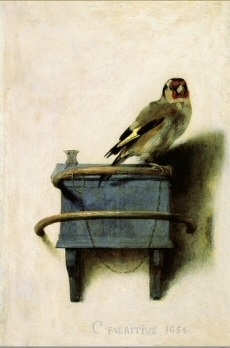 his name with a Fabritius apprentice who died in the Delft explosion.) It is the quality of the description and analysis of that process that makes Tartt’s novel such a compelling read.
his name with a Fabritius apprentice who died in the Delft explosion.) It is the quality of the description and analysis of that process that makes Tartt’s novel such a compelling read.
An early teenage Theo is in trouble at school, by association with ‘bad’ company, and has a domestic life complicated by his gambling and drinking, wastrel father’s frequent and then total absence. He has a marvellous relationship with his mother who takes the day off work to go with him to school for a conference with the head teacher. Since the appointment is later in the morning they have gone round by a New York art gallery to look at her favourite paintings. Theo spots an attractive red-haired girl around his age in the company of a much older man and, like any red-blooded teenager, tries to keep her in sight and exchange glances. Then, just when he and his mother are temporarily separated, the area near the shop is devastated by a terrorist bomb. Tartt’s narration of the events as experienced by Theo is graphic, emotionally highly charged, and powerful reading. Theo finds himself tending the old man who is clearly dying; and there is no sign of his mother or of the girl. The man thrusts a painting towards him, which is, of course, the ‘Goldfinch’ of the title and entrusts him with a gold ring with the request he deliver it. As the man dies, Theo takes the painting and, somehow, makes his way out of the devastated gallery by a side exit; and the set-up of the novel’s story is complete.
Temporarily fostered by the ‘Park Avenue’ Barbours whose son Andy is his schoolmate, Theo hides the stolen painting and eventually delivers the ring to the old man’s business partner in an antique and restored furniture business. The girl, Pippa, has survived the bomb blast but has been more extensively traumatised than Theo. They feel a bond established from their shared experiences of loss. Social workers and psychiatrists are wickedly well portrayed. They begin to talk in terms of relocating Theo with his maternal grandparents, who are not really keen on this, but, out of the blue, his father turns up again and says he will take his son back with him to Las Vegas, together with his new partner Xandra and as much as he can raise from the proceeds of the sale of his late wife’s effects. Theo manages, somehow, to take the painting with him to Vegas where he meets a new schoolmate, Boris, a feral, Russian-born petty crook and druggie, and forms a bond with him based on their parental neglect. Finally, as his money trouble’s catch up with his gambling father, Theo flees by Greyhound Bus back to New York and takes ‘refuge’ at the antique business.
Shortly after this point in the story when Theo seems to be finding his niche in antiques and restoration, we reach the beginning of Chapter 9. The rest of the book explores his relationships with Hobie, the antique restorer, with the Barbours; mother and daughter; and the reappearing Boris, no longer a petty crook, and the dilemma of what to do with the painting, for the theft of which, were he to confess and return it, he might well be sent to jail for many years.
 What with drug-taking and drinking, Theo’s life seems to be going downhill. He has taken advantage of Hobie’s clients’ ignorance and excess of wealth to sell antiques of uncertain provenance and seems to have been found out by a potential blackmailer. Boris tries to help his old friend but might just be making things worse. Theo’s love life is complicated by still being in love with the redhead but now being engaged to Kitsy Barbour.
What with drug-taking and drinking, Theo’s life seems to be going downhill. He has taken advantage of Hobie’s clients’ ignorance and excess of wealth to sell antiques of uncertain provenance and seems to have been found out by a potential blackmailer. Boris tries to help his old friend but might just be making things worse. Theo’s love life is complicated by still being in love with the redhead but now being engaged to Kitsy Barbour.
Since spoilers are forbidden in these blogs, I can only say that matters becoming more exciting than you could have imagined and that Donna Tartt stays completely in control of the narrative and the very credible denouement. I shall certainly read Tartt’s earlier novels now; especially since it might be 2025 before she publishes another!
The post ‘The Goldfinch’ by Donna Tartt sings a haunting melody appeared first on Michael Johnston's blog/website (akanos.co.uk).
November 22, 2014
‘The Collini Case’ by Ferdinand von Schirach
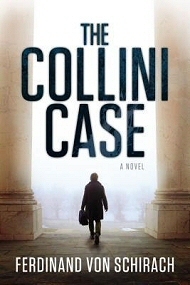 The Collini Case is a fascinating book and its author, Ferdinand von Schirach is an equally fascinating person. He is a qualified lawyer who is one of Germany’s most prominent defence counsel. As a second string to his bow he started writing and has been at least as successful doing this. His novel concerns a young, newly-qualified defence lawyer whose first brief is the legal aid defence of a man who not only admits murder but sat waiting for the police to come for him. An open-and-shut case? Well, not if you want to write an interesting crime novel.
The Collini Case is a fascinating book and its author, Ferdinand von Schirach is an equally fascinating person. He is a qualified lawyer who is one of Germany’s most prominent defence counsel. As a second string to his bow he started writing and has been at least as successful doing this. His novel concerns a young, newly-qualified defence lawyer whose first brief is the legal aid defence of a man who not only admits murder but sat waiting for the police to come for him. An open-and-shut case? Well, not if you want to write an interesting crime novel.
Von Schirach shows how the German legal system works in cases like these, with a judge, two legal and two lay advisers rather than a jury. His description of the procedure is strictly correct and the laws under which the trial operates are factual, rather than fictional. Given too that he writes about how a Nazi past has impacted on the present case, it is not without significance that the author, born in 1964, is the grandson of the man who lead the Hitler Youth. He knows his subject better than most. It is a fact too that in 2012, within months of the novel’s publication and phenomenal sales, the German Federal Minister of Justice established a committee of inquiry into the impact of on his department of the country’s Nazi past. The novel was cited as one of the reasons for this inquiry. The book makes the terrible but true revelation that reprisal killings were carried out by Allied forces as well as the Wehrmacht.
This blogger has a strict policy of no ‘spoilers’ so I cannot say too much about the plot. However, it does need to be said that there is a credulity-stretching reliance on coincidence and on one moment of realisation and revelation that only the quality of the writing (and, importantly, on the quality of Anthea Bell’s translation) manages to save. It is also, for the reasons mentioned above, a significant work. Perhaps, not as significant or as likely to be read in schools as, say, To Kill a Mocking Bird, but one that every student of law ought to read.
The post ‘The Collini Case’ by Ferdinand von Schirach appeared first on Michael Johnston's blog/website (akanos.co.uk).
November 14, 2014
‘Let me be frank with you’ by Richard Ford
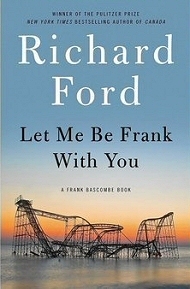 An unexpected pleasure this year was the news that Richard Ford has written a fourth “Frank Bascombe” novel. It was after meeting Ford last year at the Royal Society of Literature at a launch of his novel Canada that I learned about his earlier trio of novels in which his narrator, Frank Bascombe, recounts the events of very short periods of time, like the days leading up to the Fourth of July. However, his discursive, mildly self-critical, but appropriately frank, narrative voice allows the account of one weekend to occupy the whole novel. They also allow the reader to meet up with Frank at different stages of his life. The three earlier books are The Sportswriter (1986), Independence Day (1995), and The Lay of the Land (2006). The passage of real time between each publication suggests that Ford, whose personality, prejudices and politics might possibly colour the narration, has used Bascombe as some sort of doppelganger. Now, another eight years have elapsed and we re-encounter Frank, now 68 and living in retirement in fictional Haddam, New Jersey in December 2012. In the previous novel, he had sold his house on the Jersey Shore and moved back there; a fortunate move since, early on October 29, Hurricane Sandy curved north-northwest and then moved ashore near Brigantine, New Jersey, just to the northeast of Atlantic City, as a post-tropical cyclone with hurricane-force winds. His former home in Sea-Clift is destroyed.
An unexpected pleasure this year was the news that Richard Ford has written a fourth “Frank Bascombe” novel. It was after meeting Ford last year at the Royal Society of Literature at a launch of his novel Canada that I learned about his earlier trio of novels in which his narrator, Frank Bascombe, recounts the events of very short periods of time, like the days leading up to the Fourth of July. However, his discursive, mildly self-critical, but appropriately frank, narrative voice allows the account of one weekend to occupy the whole novel. They also allow the reader to meet up with Frank at different stages of his life. The three earlier books are The Sportswriter (1986), Independence Day (1995), and The Lay of the Land (2006). The passage of real time between each publication suggests that Ford, whose personality, prejudices and politics might possibly colour the narration, has used Bascombe as some sort of doppelganger. Now, another eight years have elapsed and we re-encounter Frank, now 68 and living in retirement in fictional Haddam, New Jersey in December 2012. In the previous novel, he had sold his house on the Jersey Shore and moved back there; a fortunate move since, early on October 29, Hurricane Sandy curved north-northwest and then moved ashore near Brigantine, New Jersey, just to the northeast of Atlantic City, as a post-tropical cyclone with hurricane-force winds. His former home in Sea-Clift is destroyed.
Let me be frank with you recounts four episodes in the run up to Christmas 2012. In the first, Bascombe gets a call from Arnie to whom he sold his Sea-Clift house. He has no legal, nor even any moral obligation to Arnie but he does drive down to the wrecked shore at Arnie’s invitation. For me, the quality of Ford’s writing shines through the narration from the very opening passage.
Strange fragrances ride the twitchy, wintry air at The Shore this morning, two weeks before Christmas. Flowery wreaths on an ominous sea stir expectancy in the unwary.
It is, of course, the bouquet of large-scale home repair and re-hab. Fresh-cut lumber, clean, white PVC, the lye-sniff of Sakrete, stinging sealants, sweet tar paper, and denatured spirits. The starchy zest of Tyvek mingled with the ocean’s sulphurous weft and Barnegat Bay’s landward stink. It is the air of full-on disaster. To my nose – once practiced in these things – nothing smells of ruin as fragrantly as the first attempts at rescue.
I notice it first at the red light at Hooper Ave., and then again when I fill up my Sonata at the Hess, before heading to the bridge, Toms River to Sea-Clift. Here in the rich gas-station scents, a wintry breeze flitters my hair while my dollars spool along like a slot machine in the gathering December clouds. Breeze has set the silvery whirly-gigs to spinning at the Grandly Re-Opened Bed Bath & Beyond at the Ocean County Mall (“Only new bedding can keep us down”). Across its acres of parking, a tenth full at ten A.M., The Home Depot – Kremlin-like, but enigmatically-still-your-friend-in-spite-of-all – has thrown its doors open wide and early. Customers trail out, balancing boxes of new toilet works, new motherboards, new wiring harnesses, shrink-wrapped hinge assemblies, hollow-core doors, an entire front stoop teetering on a giant shopping cart. All is on its way to some still-standing domicile blotto’d by the hurricane – six weeks past, but not lost from memory. Everyone’s still stunned here – quarrelsome, funked, put-upon-but-resolute. All are committed to “coming back.”
In earlier reviews of the Bascombe books, and of Canada, I have suggested that Ford’s command of language; his ability to conjure up sights, sounds, smells – the whole synaesthesia – put his writing on a par with Marcel Proust. Nothing in this latest book would change my mind about that. Me being me, I am especially taken with ‘Frank’s’ comments on current American (and British) uses and usages of language when he identifies words and phrases that we could all manage without and suggesting that, as we get older we should discard unnecessary baggage of all sorts. However, in the passage cited below, he gives me a new word, “mentation”, which I have still to find in the dictionary!
In recent weeks I’ve begun compiling a personal inventory of words that, in my view, should no longer be usable – in speech or any form. This, in the belief that life’s a matter of gradual subtraction, aimed at a solider, more-nearly-perfect essence, after which all mentation goes […] A reserve of fewer, better words could help, I think, by setting an example for clearer thinking. […] When you grow old, as I am, you pretty much live in the accumulations of life anyway. Not that much is happening, except on the medical front. Better to strip things down. And where better to start stripping than the words we use to express our increasingly rare, increasingly vagrant thoughts. It would be challenging, for instance, for a native Czech speaker to fully appreciate the words poop or friggin’, of the phrase “We’re pregnant,” or “What’s the take-away?” Or, for that matter awesome when it only means “tolerable.” Or preemie or mentee or legacy. Or no problem when you really mean “You’re welcome.” Likewise, soft landing, sibs, bond, hydrate (when it just means “drink”), make art, share, reach out, noise used as a verb and […] fuck, to me, is still pretty serviceable as a noun, verb, or adjective, with clear and distinct colorations to its already rich history. Language imitates the riot, the poet said. And what’s today’s life like if not a riot?
The ‘poet’ was Ben Jonson who wrote, “Wheresoever manners and fashions are corrupted, language is. It imitates the public riot.” And as regards the use of the F word, which the song says is used by writers who once used better words, it is true that Proust would have used a less ‘shocking’ illustration but my central case for Ford is that he is not only a master of his craft of writing, of language, but also is a compelling and engaging storyteller. I commend not only Let me be frank with you but Ford’s complete works, to date, and what, one sincerely hopes, is still to come.
My other Ford blogs:
Overview of the first three ‘Bascombe’ novels,
The Sportswriter,
Canada.
(All blog references to Ford can be found by clicking on the Richard Ford tag below.)
The post ‘Let me be frank with you’ by Richard Ford appeared first on Michael Johnston's blog/website (akanos.co.uk).
November 7, 2014
Frank Bascombe is back! Ford makes it a quartet
My next blog will be on the newly published Let me be Frank with you which is a welcome addition to Richard Ford’s three Frank Bascombe novels about which you can read in earlier blogs (click on the Richard Ford link in the Tagged list below). It promises to be every bit as good, maybe, as he matures, even better, than the first three. Put it on your Christmas list for yourself and even give copies to others! My review in about a week.
The post Frank Bascombe is back! Ford makes it a quartet appeared first on Michael Johnston's blog/website (akanos.co.uk).
November 2, 2014
The Assassination of Margaret Thatcher by Hilary Mantel – fiction, not fact!
 The provocative title of Hilary Mantel’s recent collection of short stories is what may attract some readers to the book but ‘The Assassination of Margaret Thatcher’ is the final story in a splendid set of ten that each repay close reading. Short stories are like chamber music, or perhaps Lieder, as compared to symphonies or operas as long as a novel. The jewel-like compression of the structure, exposition and development into only a few pages, means that every note Mantel strikes has to have been chosen with great deliberation.
The provocative title of Hilary Mantel’s recent collection of short stories is what may attract some readers to the book but ‘The Assassination of Margaret Thatcher’ is the final story in a splendid set of ten that each repay close reading. Short stories are like chamber music, or perhaps Lieder, as compared to symphonies or operas as long as a novel. The jewel-like compression of the structure, exposition and development into only a few pages, means that every note Mantel strikes has to have been chosen with great deliberation.
Mantel uses many voices and different narrative styles for each story. There are surprises and slow reveals that make the reading more compelling. It takes you four pages to realise where the narrator is in ‘Sorry to Disturb’. It takes the whole story to reach the climaxes of ‘The Long QT’ and ‘Winter Break’. Each is a slice of life seen through the prism of a vivid and fertile imagination. Sometimes it is a slice of a writer’s life dealing with those parts of the work that are peripheral to, even interfere with, the writing process but ‘come with the territory’ as in ‘How Shall I Know You?’ Each is a gem but there is a wonderful, unique and unexpected ‘flaw’ in each jewel that can make the reader gasp with pleasure.
The title story recounts an improbable and fictional event and, at one point, there is a post-modernist touch that lifts the writing to another plane. Does ‘The Assassination of Margaret Thatcher’ actually happen? I strongly urge you to read all the way through the book, saving this story for last. And once you have done that, then and there or some time later, savour them all again, discovering more nuances than you realised at the first reading.
When, a few years ago, in my MA Dissertation, I discussed the impact of Margaret Thatcher on contemporary fiction, I found that while before Thatcher many novelists feared a left-wing coup led by militant trade unions, after Thatcher, no one had a good word to say about her regime and her person. Mantel fits into this pattern and her sketch of the person is eerily accurate.
Now, Dame Hilary, get back to that third novel of the Thomas Cromwell trilogy we are all waiting for!
The post The Assassination of Margaret Thatcher by Hilary Mantel – fiction, not fact! appeared first on Michael Johnston's blog/website (akanos.co.uk).
October 27, 2014
A Most Wanted Man by John Le Carré
 Every so often I give myself the vicarious thrill of reading a novel by John Le Carré, and his recent book A Most Wanted Man has not let me down. Le Carré constructs his spy thrillers like the fuse of a bomb so that the explosion is on the last page and the reader, protected from lethal impact, can see that, as so often in real life, it’s the bastards who really win in the end. But it is not until the last four or five pages that we can begin to sort out who are the genuine goodies and who the real baddies. Is John Le Carré, a one-time MI6 operative, a realist, or just a cynic who writes like a poet?
Every so often I give myself the vicarious thrill of reading a novel by John Le Carré, and his recent book A Most Wanted Man has not let me down. Le Carré constructs his spy thrillers like the fuse of a bomb so that the explosion is on the last page and the reader, protected from lethal impact, can see that, as so often in real life, it’s the bastards who really win in the end. But it is not until the last four or five pages that we can begin to sort out who are the genuine goodies and who the real baddies. Is John Le Carré, a one-time MI6 operative, a realist, or just a cynic who writes like a poet?
This novel has a long fuse and the way it begins alerts the reader to the workings of the very competitive teams of spy catchers who exist in the very young Federal Republic of Germany.
Half-Chechen Issa (the Arabic form of ‘Jesus’) turns up as an illegal immigrant in Hamburg. But, clearly, he has been funded and assisted in getting there. The authorities who are all looking for him want to use him for their own purposes and label him a Chechen terrorist.
He says he has come to claim his inheritance that sits in a shady numbered account in a private bank. His charity-funded civil-rights lawyer, Annabel Richter, works to keep him safe from arbitrary deportation to Turkey or Russia, where tender mercy does not seem to be on offer. When he meets her, 60-year-old private banker Tommy Brue of Brue Frères feels the stirrings of late-flowering love and wants to protect her and keep her safe. The gnarled old field operator, Gűnter Bachmann, now minding a desk in Hamburg because he ruffles the feathers of the Joint Steering Committee in Berlin, deploys his years of experience, his fluency in Arabic and Russian as well as his native German, to concoct a simple scheme to get evidence against a Muslim scholar who has long been suspected of being the banker to the bombers. You know it cannot end well.
But the enjoyment of A Most Wanted Man lies in witnessing the duplicitous interplay between the various arms of the security services, played out in the background against the counterpoint of the human feelings of the banker and the lawyer caught up in the whole intrigue. Le Carrè is guilty of only one cheap joke but it is a good one; one that sums up what might serve as the motto for all his spy thrillers – “Life’s a botch.” And then I sigh: and promise myself I shall read another one of his marvellous books soon.
The post A Most Wanted Man by John Le Carré appeared first on Michael Johnston's blog/website (akanos.co.uk).
October 19, 2014
“Everyman” or The Gripes of Roth
 Philip Roth has done more than enough to be awarded the Nobel Prize for Literature; an award to mark not a single book but a lifetime’s contribution to literature. But, once again, he hasn’t been given it and, once again, a rash of articles have appeared deploring this and recalling the tetchy comments journalists have coaxed out of him in the past on this subject. Patrick Modiano is a very fine writer and I hope he doesn’t spend all the money in one shop but, like Graham Greene, Roth must wonder if the judges or their advisers are trying to tell him something.
Philip Roth has done more than enough to be awarded the Nobel Prize for Literature; an award to mark not a single book but a lifetime’s contribution to literature. But, once again, he hasn’t been given it and, once again, a rash of articles have appeared deploring this and recalling the tetchy comments journalists have coaxed out of him in the past on this subject. Patrick Modiano is a very fine writer and I hope he doesn’t spend all the money in one shop but, like Graham Greene, Roth must wonder if the judges or their advisers are trying to tell him something.
I’ve been reading Everyman which came out in 2006. It is vintage Roth. There is a risk: with an author who so frequently portrays his New Jersey roots and the exquisitely well-tuned angst of his Jewish male characters who enjoy sex enormously but cannot get the rest of their lives in order: that you find yourself wondering if you’ve read this one already. Like a great composer writing variations on a theme, Roth may go over the same ground geographically and imaginatively but every time he takes a new and still more subtle route.
The book is a gentle arc, opening with a funeral where the unnamed Everyman’s close families – he had three wives – are gathered round his coffin. They bury the never-named central character and merge into a story of his childhood in Elizabeth NJ, as Howie’s kid brother and the son of loving parents. His father runs a jeweller and watchmaker’s shop and it is a rite of passage when the kid brother starts to take the bus into Newark with hundreds of dollars’ worth of diamonds in an envelope in an inside pocket for him to hand over to the setters and sizers with his father’s neatly written instructions.
Everyman was still a boy when the Second World War began when the odd drowned seaman would wash up on Jersey’s shore and would put him off the beach for a while. He progressed through art school to a job in advertising, rising to the height of Creative Director in a prestigious agency but, this being a novel by Roth, he had ongoing problems with his libido. The upshot is that he has not just one but three divorces, alienates his ex-wives and all but one of his children, the kind and helpful daughter Nancy. Unlike his elder brother, a picture of health and creator of much wealth, Everyman has heart problems that come at him with increasing frequency after his early retirement to develop his painting skills.
It’s easy to quickly sketch the outline of the novel but it takes Roth’s genius to paint the details that make his work stand out. Like the scene in the ante-room to the operating theatre where several gowned men are waiting their turn with Everyman.
You would have thought from the calm in the room that they were going off to get their hair cut, rather than, say, to get the artery leading to the brain sliced open.
At one point, the man to his side, having handed him the sports section, quietly began talking to him. He was probably only in his late forties or early fifties, but his skin was pasty and his voice was not strong or assured. “First my mother died,” he said, “six months later my father died, eight months after that my only sister died, a year later my marriage broke down and my wife took everything I had. And that’s when I began to imagine someone coming to me and saying, ‘Now we’re going to cut off your right arm as well. Do you think you can take that?’ And so they cut off my right arm. Then later they come round and they say, ‘now we’re going to cut off your left arm.’ Then, when that’s done, they come back one day and they say, ‘Do you want to quit now? Is that enough? Or should we go ahead and start in on your legs?’ And all the time I was thinking, When, when do I quit? When do I turn on the gas and put my head in the oven? When is enough enough? That was how I lived with my grief for ten years. It took ten years. And now the grief is finally over and this shit starts up.”
Roth not only writes well but he writes succinctly and few of his novels are massive tomes. In the case of Everyman we are back within a few days of the opening scene within the span of 182 pages, each one a carefully cut diamond of prose.
Read this Roth; read more Roth and, if you have any friends in the Norwegian Nobel Prize committee, drop a few hints that it’s more than time that this grumpy old man is made a Laureate.
The post “Everyman” or The Gripes of Roth appeared first on Michael Johnston's blog/website (akanos.co.uk).
October 11, 2014
Man Booker Prize prediction: The Narrow Road to the Deep North by Richard Flanagan
 It’s that time of year again when Man Booker judges will pick one from six and award the prize, which I think should go to Richard Flanagan for his moving and gripping novel, The Narrow Road to the Deep North.
It’s that time of year again when Man Booker judges will pick one from six and award the prize, which I think should go to Richard Flanagan for his moving and gripping novel, The Narrow Road to the Deep North.
Flanagan is an established Australian novelist, born in Tasmania and the son of a Burma Death Railway survivor who, if you are looking for symbolism, died the day his son’s novel was completed. Writers are encouraged to write from what they know; which is sometimes a risky precept; but it is legitimate to draw on your capital of life experiences and invest the proceeds in your new project, which Flanagan has so ably done in The Narrow Road to the Deep North.
The author’s central character is Dorrigo Evans, born in rural Tasmania at the outbreak of World War I and who goes on to qualify as a surgeon, is called up and has reached the rank of Colonel by the time he is taken prisoner by the Japanese. He is the only doctor and senior officer in a prison camp where the inmates are made to work on the Burma-Siam railway construction and he cannot escape taking decisions that will send some men to near-certain death while sparing others who are likely to die anyway. The multi-voiced narrative allows the reader to inhabit the minds of many of the characters in the drama, the Japanese and Korean soldiers as well as the Aussies.
As the novel moves seamlessly backwards and forwards in time, we live through Dorrigo’s first passion for Amy the young wife of his uncle which he has to balance against his commitment to an engagement to Ella, the fiancée who waits for his return as a ‘war hero’ from the POW camp. He expresses his frustration by a series of loveless affairs. None of this stops him from rising steadily in his profession.
What makes this novel stand out from the rest is the Breughel-like picture, horrendous overall but rich in rewarding detail, that Flanagan paints. The mindless Korean sergeant, who hates the Japanese just as much as he enjoys brutalising the prisoners; the Japanese prison commandant who survives the war and the hunt for war criminals to die in his own bed – we may well loath him but we can understand him; the courage and survival instincts of the prisoners in conditions none of us can fully comprehend and, in the main, could never survive ourselves, but must never be allowed to forget. Of the many quotable passages in this savagely wonderful book, I choose a quirky moment in the quagmire that is the parade ground where the roll-call is taking place.
It’s nature’s cathedral, Rooster MacNeice said, pointing at a grove of tall bamboos.
Jimmy Bigelow, raising his sunken eyes skywards, could see only the still-dark early morning sky and the black jags of jungle below it.
Rightio, Jimmy Bigelow said.
Look at the way they lean into each other to form these great gothic arches, Rooster MacNeice said. And behind them, the teak trees those filigree lines like glass leading.
Jimmy Bigelow stared into the gloomy treeline. He asked if Rooster meant like King Kong. His tone was unsure.
I believe there are vitamins in beauty, Rooster MacNeice said.
Jimmy Bigelow said he thought that vitamins were in vitamins.
Beauty, I said, said Rooster MacNeice.
He believed no such thing but had heard Rabbit Hendricks going on with some such nonsense. Such higher sentiments, being higher, even when stolen from others, he saw as evidence of a finer character that set him apart from the lower order and would ensure his survival.
I am looking forward to next week and the judges’ decision but I have put my money on Flanagan. What about you?
The post Man Booker Prize prediction: The Narrow Road to the Deep North by Richard Flanagan appeared first on Michael Johnston's blog/website (akanos.co.uk).
September 21, 2014
Angus Wilson’s “The Old Men at the Zoo” has not aged well
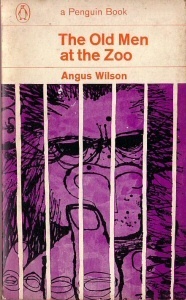 This was my first reading of Angus Wilson’s 1961 novel The Old Men at the Zoo and I confess I was disappointed. When, a few years back, I wrote my dissertation on the influences of Margaret Thatcher on contemporary literature [The Blue River of Truth is available to read and download on my website.] I discovered a group of seemingly very right-wing novelists who were writing in the sixties and seventies of the last century, and who wrote dystopian predictions of both Communist and Fascist revolutions taking hold in the Disunited Kingdom as a continuation of and/or reaction against post-war militant trade unionism. I called them Pre-Thatcherist novels and they were examples of what the able critic D J Taylor labelled ‘bourgeois hysteria’. I cited novelists like Kingsley Amis, Anthony Burgess, Margaret Drabble, Piers Paul Read and the lesser known Julian Fane. To this list I must now add Angus Wilson on the evidence of The Old Men at the Zoo.
This was my first reading of Angus Wilson’s 1961 novel The Old Men at the Zoo and I confess I was disappointed. When, a few years back, I wrote my dissertation on the influences of Margaret Thatcher on contemporary literature [The Blue River of Truth is available to read and download on my website.] I discovered a group of seemingly very right-wing novelists who were writing in the sixties and seventies of the last century, and who wrote dystopian predictions of both Communist and Fascist revolutions taking hold in the Disunited Kingdom as a continuation of and/or reaction against post-war militant trade unionism. I called them Pre-Thatcherist novels and they were examples of what the able critic D J Taylor labelled ‘bourgeois hysteria’. I cited novelists like Kingsley Amis, Anthony Burgess, Margaret Drabble, Piers Paul Read and the lesser known Julian Fane. To this list I must now add Angus Wilson on the evidence of The Old Men at the Zoo.
In assessing a book written in 1960 and that predicts a European war in the late sixties from which Britain would not emerge victorious, one must avoid the pitfall of too much hindsight. It didn’t happen, did it, and some of the language and attitudes Wilson gives his characters now seem faintly risible. However, the novel is an excellent example of the kind of political and social thinking that was prevalent then – when, for example, hanging was still legal and homosexuality was not yet so.
The narrator, Simon Carter is a sometime zoologist turned civil servant and administrator who has been seconded to London Zoo as its Secretary in order to install order into its chaotic administration. He has the good fortune to be married to a wealthy American heiress which means that he does not need to subsist on his modest salary. The book opens with ghoulish humour as Carter recounts how an inexperienced young keeper has been killed by a normally tranquil giraffe. While Carter wants to have the whole matter investigated and the causes publicly revealed, the ‘Old Men’ want to sweep the problem under the cage for fear it affects the TV programme the Director is working on or the public’s attitude to the Zoo and to their research. Carter begins to emerge as something of a young prig and as a narrator who is not aware how much he is revealing himself as he relates the story.
The Zoo’s President, Lord Godmanchester, is an ageing politician currently out of office but who feels that (like Churchill perhaps) he is the only person who can unite and save the nation. He also wants to establish a National Nature Park on the Welsh Marches where the wild, non-native creatures would roam free. There is a suspicion that this is also a ploy to evacuate the Zoo’s animals from a capital under threat from the war that might break out.
Wilson does an excellent job in depicting the various Curators of the different species and their personal quirks and obsessions; their insistence that the role of the Zoo is research rather than public entertainment. He describes the conflicted Carter, trying to balance his blissful domestic life with his battles with the Old Men. He is less successful, with me at least, in retaining the reader’s sympathy with and for Carter.
War does break out and, for a while, it goes very badly for Britain. Fascist Uni-Europeans take charge and one of their leaders becomes the Zoo’s President. He has the aim of bringing back the Roman Circus where the Zoo’s bears would publicly tear miscreants to pieces. Carter, accused of being a modern-day Vicar of Bray, survives the changes of political control right through to the restoration of pre-war quasi-normality and his marriage is threatened by his willingness to continue as an administrator for the sake of the Zoo rather than oppose the rulers and maybe die for his pains. Thus, serious issues emerge from the author’s mild humour and the narrator’s conflicts. There is a final resolution of sorts.
While I really enjoyed Wilson’s Anglo-Saxon Attitudes, my Norman French attitude to this book is one of mild disappointment. I suspect that nowadays The Old Men at the Zoo is probably only going to be read by academics. Sorry Sir Angus!
The post Angus Wilson’s “The Old Men at the Zoo” has not aged well appeared first on Michael Johnston's blog/website (akanos.co.uk).
Michael Johnston's Blog
- Michael Johnston's profile
- 4 followers



